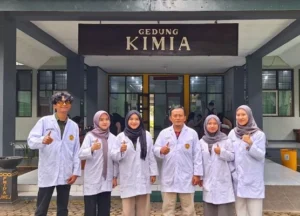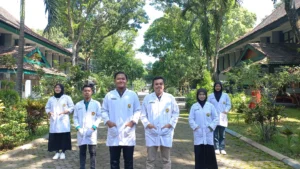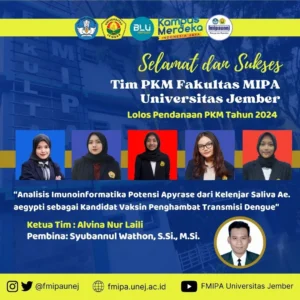 The Student Creativity Program Team for Exact Research (PKM-RE) Faculty of Mathematics and Natural Sciences, Jember University presented an innovative solution to overcome the problem of microalgae waste. The team headed by Imelda Dwi Puspita from the Chemistry Department consisted of Muhammad Ragil Ainur Rahman, Ka’aziyah Aulia Nada, and Sya’rifa Salma Musliyati Putri from the Chemistry Department and Silfia Ayuni from the Biology Department. This team is guided by chemistry and environmental lecturer Dr. Bambang Piluharto, S.Si., M.Si. from the Chemistry Department, FMIPA UNEJ and passed the 2024 PKM 8 Sector funding stage. This research is entitled “Flokulasi Mikroalga Menggunakan Kitosan Magnetik serta Uji Potensinya sebagai Pupuk N dan P”.
The Student Creativity Program Team for Exact Research (PKM-RE) Faculty of Mathematics and Natural Sciences, Jember University presented an innovative solution to overcome the problem of microalgae waste. The team headed by Imelda Dwi Puspita from the Chemistry Department consisted of Muhammad Ragil Ainur Rahman, Ka’aziyah Aulia Nada, and Sya’rifa Salma Musliyati Putri from the Chemistry Department and Silfia Ayuni from the Biology Department. This team is guided by chemistry and environmental lecturer Dr. Bambang Piluharto, S.Si., M.Si. from the Chemistry Department, FMIPA UNEJ and passed the 2024 PKM 8 Sector funding stage. This research is entitled “Flokulasi Mikroalga Menggunakan Kitosan Magnetik serta Uji Potensinya sebagai Pupuk N dan P”.
Microalgae are photosynthetic aerobic organisms that grow widely in shrimp ponds. These organisms can become agents of water pollution if not managed properly. “Microalgae contain high nutrients but can cause eutrophication and disrupt the balance of the pond ecosystem,” said Imeda. Apart from microalgae, shrimp ponds also produce other waste in the form of shrimp shells. The abundance of shrimp ponds also increases the amount of shrimp shell waste produced, so creative innovation is needed to maintain ecosystem balance. Continue reading




